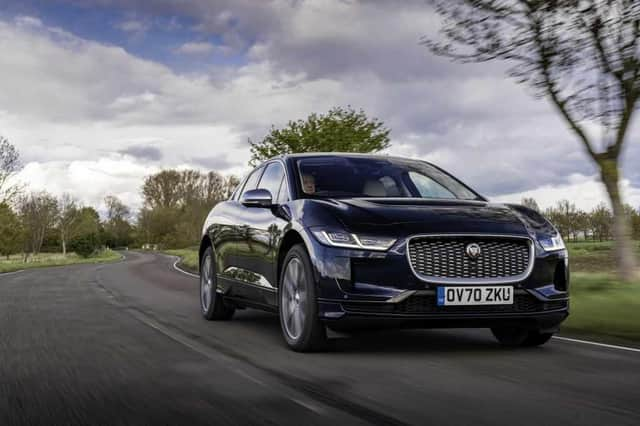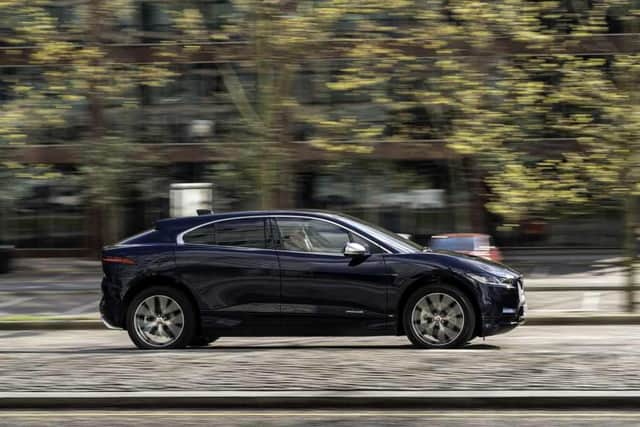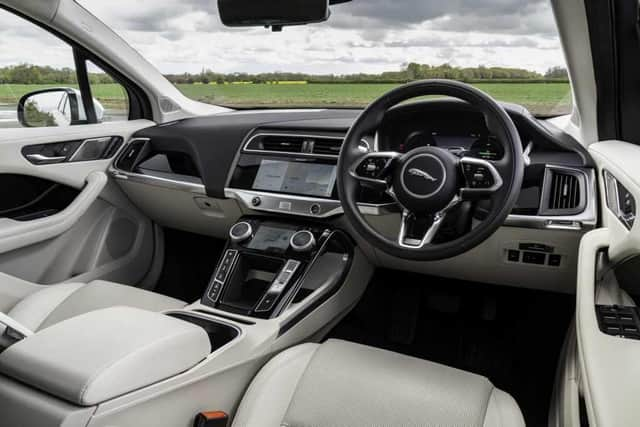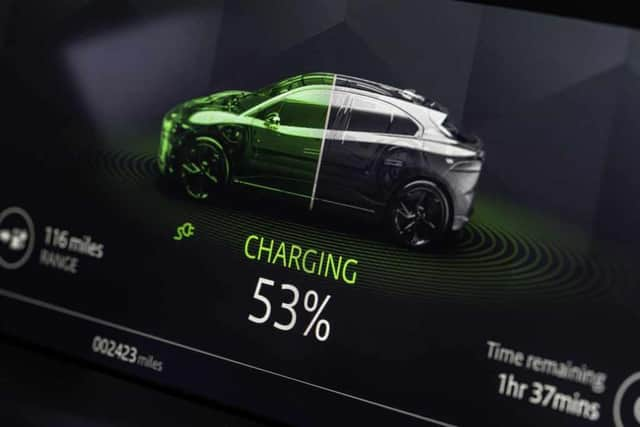Jaguar I-Pace review: Pace and grace hint at promising electric future for Jaguar


The last time I saw a Jaguar I-Pace up close was in Dundee’s stunning V&A design museum as a bonafide art exhibit. Hewn from clay, the life-sized model’s presence in the 21st century home of Scottish design excellence felt wholly appropriate.
Like the famous building at the heart of Dundee’s waterfront, the Jaguar is a striking combination of curves and angles, imposing in scale and suggestive of power. As the V&A is a focal point for the regeneration of Dundee so the I-Pace is a symbol of the brand Jaguar wants to become in the 21st century - modern, desirable, unique.
Advertisement
Hide AdAdvertisement
Hide AdThe I-Pace concept made its debut at motoring shows back in 2016 and the production car remains faithful to that bold design. Here in the present, a mere five years later, Teslas and all-electric models from mainstream manufacturers are commonplace enough that they are no longer considered rarities - but the I-Pace looks as futuristic now as it did when surrounded by the press in Los Angeles.


The interior of our top-spec HSE test model looks and feels every inch the premium model one would expect from the price tag. Those materials not leather-covered or brushed aluminium are soft-touch or high-gloss and, as modern as it feels with the wide-screen media monitor and digital instrument display, the layout is fairly traditional by EV standards. The I-Pace might have been designed as an EV from the ground up, but from the chunky and reassuringly solid cabin it feels like a luxury SUV first, and a display of high-tech eco-engineering second.
Close the door and you feel far away from the outside world, the cabin is so quiet and, in motion, the I-Pace feels immune to the worst of the wind noise and drag that plagues many electric vehicles. Like all EVs, the Jaguar lacks the rumble of an internal combustion engine to mask exterior noise, but the acoustic laminated glass windscreen - standard across the I-Pace range - and aerodynamic shape insulate the cabin from most of it.
And you can block out the rest with the Meridian surround-sound audio system that comes with the top-spec HSE trim level, along with unique 20-inch gloss black alloy wheels, matrix LED headlights, Windsor leather interior and an upgrade to 16-way adjustable front seats from an eight-mode set-up.
Advertisement
Hide AdAdvertisement
Hide AdExterior dimensions are 4,682mm by 1,895mm, which puts it slightly smaller than Jaguar’s more traditional SUV the F-Pace, and that presence actually does translate to decent space inside for both driver and passengers. Head and leg room is good in the back seat for most adults although, due to the chunky dashboard fittings, plush upholstery and small rear windows it does feel cosier than it ought to. The driver’s position isn't as domineering as it might be in some SUVs and I felt the chunky A-pillars obscured the view a touch at times at the periphery.
The high, swooping rear windscreen looks terrific from the outside but the view through it is fairly limited. Thankfully, the high-definition view from the forward and rear-facing parking cameras is crystal clear and provides a great view of your surroundings. My one criticism of the system is the overly-cautious parking sensors that scream blue murder with acres of space to spare. The I-Pace is a big car, but it’s not that big.


Powered by a 90KWh battery that drives two independent electric motors, the four-wheel drive I-Pace is no lumbering milk float. Developing 395bhp and 513lb ft of torque the Jaguar is capable of a 0-62mph time of 4.8 seconds - that’s the same as an Aston Martin Rapide S V12.
A 2.2-tonne SUV like this has absolutely no business handling as well as it does. The steering is precise and weighted perfectly and the grip is extremely impressive when cornering. The not inconsiderable weight of the low-mounted battery packs gives the I-Pace a low centre of gravity which, paired with the supple suspension means it behaves like a sports car. The (optional) active air suspension fitted to our test car has range benefits too, automatically lowering the car by 10mm when travelling at speeds in excess of 65mph to improve aerodynamics.
Advertisement
Hide AdAdvertisement
Hide AdIt might handle like a much lighter car, but braking at speed brings the sheer weight of the Jaguar foremost to mind. On an early drive during our test I became suddenly very conscious of the laws of physics and momentum and learned to leave ample - very ample - time to stop when applying the brakes on a downhill stretch from speed.
As exciting as sports car handling, straight line speed and rapid acceleration are, they aren’t the stats that matter the most if you’re planning on buying and running an electric vehicle. The numbers that count for anyone taking the plunge into electric motoring are range and charge time. The 292-mile maximum range of the I-Pace is up there with the best performers in the market but less than that offered by the 300-plus mile Teslas that are bound to be the benchmark for anyone shopping in this price bracket.


Jaguar’s official site estimates the full charge time of the I-Pace as 13 hours from an approved 22kW fast charger. The I-Pace is, however, rapid charge capable and according to Zap Map will manage an 80 per cent charge from a 100kW unit in 45 minutes. I also tested out a charge on a domestic socket via a three-point plug and managed to add 50 miles of range from a six-hour spell.
The Jaguar I-Pace is undoubtedly a head turner and it inspired as much admiration on the roads as it did on the gallery floor at the V&A. I lost count of the number of neighbours that asked me about the demonstrator during the test and, one Saturday, I even returned to a retail park car park to find a father and son peering through the windows and discussing the performance - cue the awkward chat as they questioned me about the car and I had to explain that it wasn’t actually mine and I hadn’t properly read the spec sheet yet either.
Advertisement
Hide AdAdvertisement
Hide AdIt’s going to be a challenge for some established manufacturers to make the transition to all-electric technology and hold on to their hard-won, decades long reputations for cars that drive in a particular way, as they adopt the relatively homogenous electric motor over internal combustion.
Nose-against-the-glass good looking, poised, sporty, comfortable and luxurious, the I-Pace is exactly what a Jaguar should be, however - and the absence of a V8 growl from beneath the bonnet does nothing to diminish that.
Jaguar I-Pace EV400 HSE
Price: £74,395 (£77,015 as tested); Motor: Single 100kW synchronous motor; Battery: 90kWh; Power: 395bhp; Torque: 513lb ft; Transmission: Single-speed, all-wheel-drive; Top speed: 124mph; 0-62mph: 4.8 seconds; WLTP range: 253 – 292 miles
